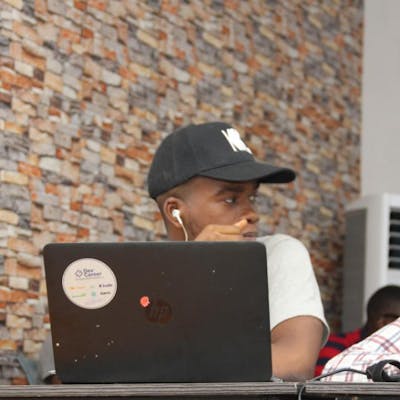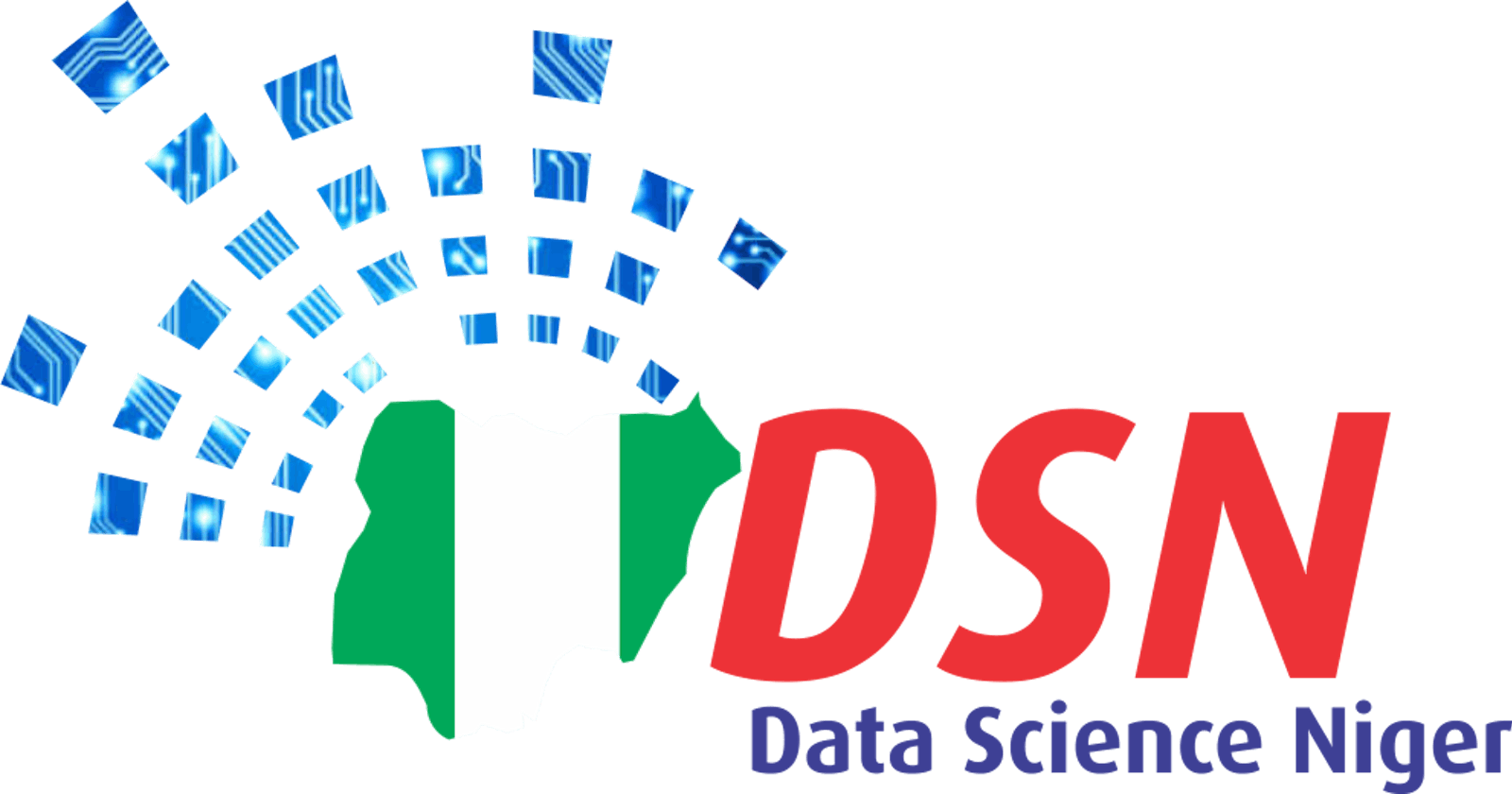DataScienceNigeria Artificial Intelligence Bootcamp 2019: Reviews & Reflections
Hello, everyone! First of all, I'd apologize for breaking the promise I made here. The bootcamp was really, really intensive hence, there was no spare time to write daily reports.
I'd also apologize for posting real late, I mean, it's been two solid weeks since the bootcamp ended. I've been trying to get up to speed with schoolwork and other niggling engagements.
Hence, as a means of pacification, I made this giant report which is a compilation of all my activities at the bootcamp. I hope this'd deaden your initial disappointment.
Tuesday 19 November 2019: Welcome Session.
I spent long long hours in traffic jams, hence I couldn't attend the Artificial Intelligence for Socio-Economic Development Summit at Oriental Hotel, Lagos, which was a gathering of the global ecosystem enterprise, startups and investors aimed to support Data Science Nigeria's vision of building Nigeria's AI ecosystem with proven AI solutions to tackle Africa's socio-economic problems.
Moreover, Dr. Bayo Adekambi's AI book for Nigerian primary and secondary schools was launched at the summit.
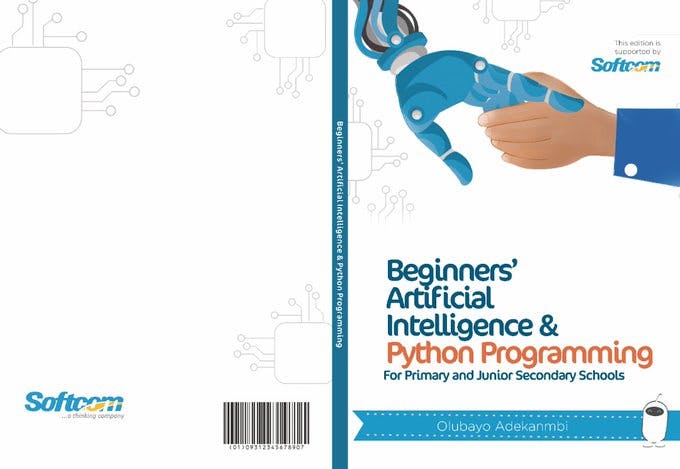
I headed straight to University of Lagos' New Engineering Hall where the bootcamp was being held. I checked in, collected my ID card and branded t-shirt.
Camp Rules & Welcome Address
by the Convener, Dr. Bayo Adekambi, Lead Mentor & Founder, Data Science Nigeria.
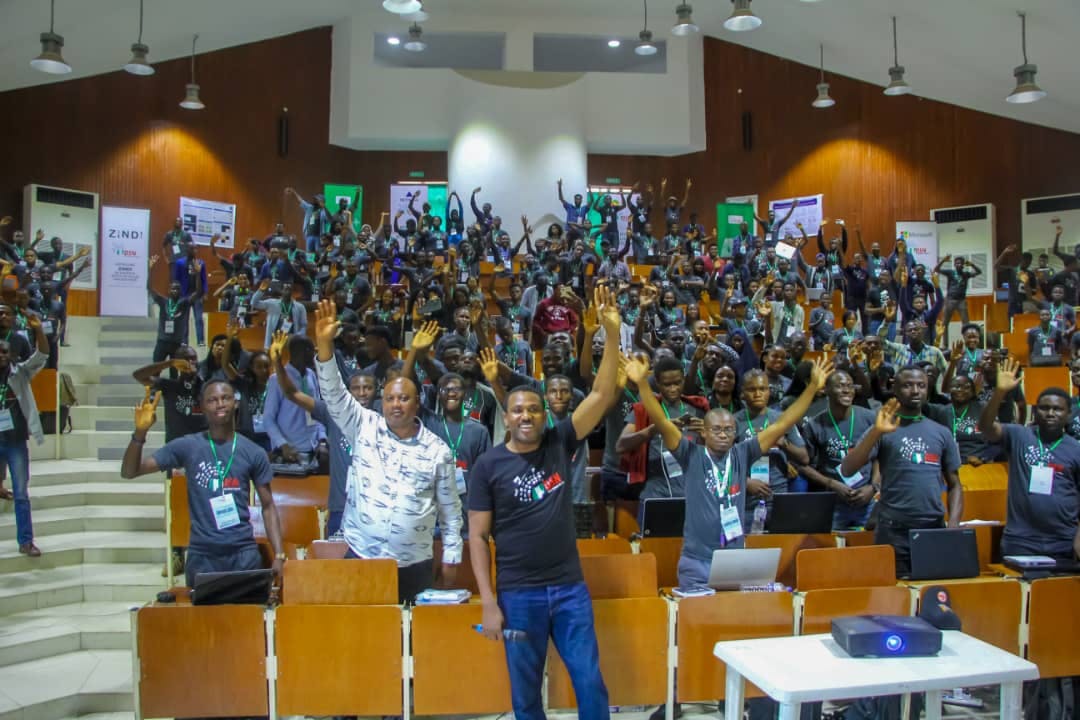
This was the first time I'd actually see or heard Dr. Bayo speak. And believe me, I was greatly impressed and touched by his charisma. Here we were informed about the camp rules and regulations. He talked about the various sponsors of the bootcamp, what we are to expect at the camp, what we are expected to gain by the end of the bootcamp.
It is just what to expect from a welcome address infused with Dr. Bayo's kind of personality.
Masterclass on Emerging Trends in Machine Learning/Artificial Intelligence in the business space
by Babatunde Adeniran & Esemeje Omole; Data Scientists, Terragon Group, Nigeria.
This session was all about the new trends in AI. Speaking of trends like;
- AutoML
- Conversational AI e.g. Chatbots.
- AI assistants e.g. Siri, Alexa, Google Assistant, etc.
- Federated Learning - which is a machine learning technique that trains an algorithm across multiple decentralized edge devices or servers holding local data samples, without exchanging their data samples.
- AI-enabled chips.
- Speech Recognition, Computer Vision, etc.
The speakers also discussed about ways through which Terragon Group do make their profits, which are;
- Marketing & Advertising.
- Lookalike Modelling.
- Using data to drive market, create awareness, etc.
At the end of the session, there was a Kahoot Quiz after which the top 3 winners were given prizes.
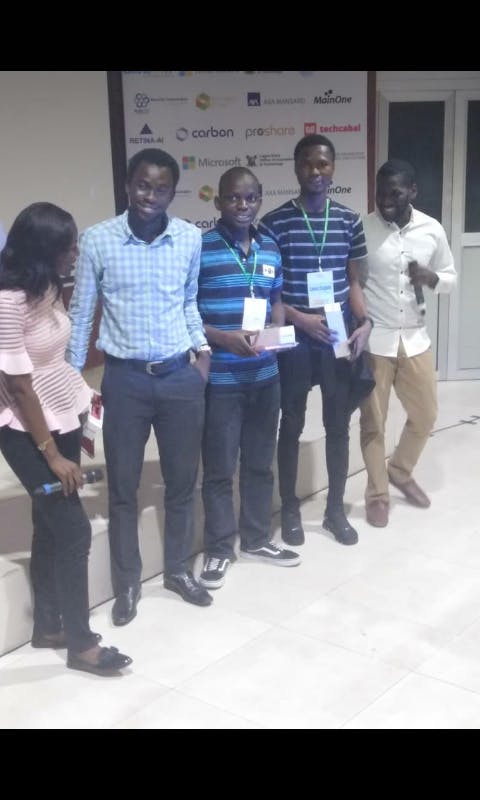
Dinner and Check-in into rooms
Wednesday 20 November 2019: Tools, Concepts and Frameworks
Breakfast.
Geospatial Data Analysis and Artificial Intelligence using GRID3.;
by Wole Ademola Adewole , GIS consultant, GRID3 Nigeria;
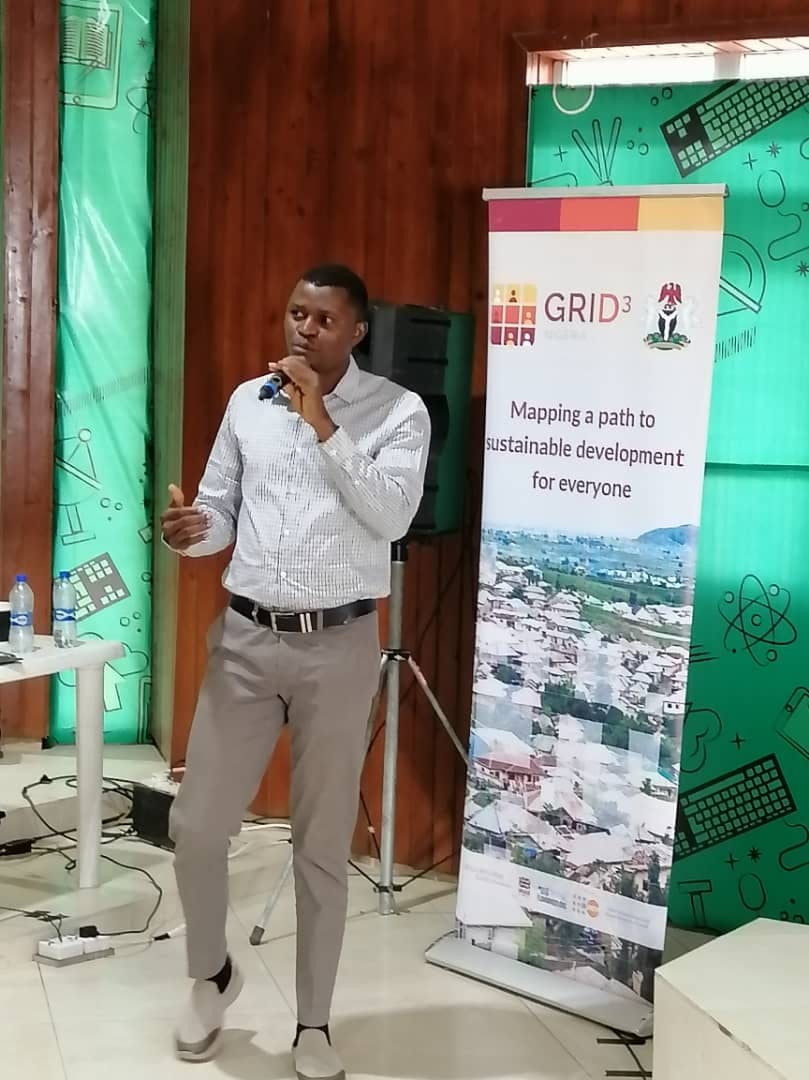
This speaker talked about Geographic Information System (GIS) which is a system for capturing, storing, checking, manipulating and displaying data which are specifically referenced to the earth. He defined what GRID3 represent and what they aim to achieve - part of which are;
- Building spatial data solutions that make development goals acheivable.
- Housing census and hybrid census support.
- Comprehensive settlement locations.
- Locating critical infrastructure.
- Harmonizing subnational boundaries. etc. And lastly, he talked about the types of Geographical information, GIS Data Models and GIS Applications and Impact.
Parallel Classes
The parallel classes were held at Centre of Information Technology and Systems, University of Lagos. One could only attend one of the parallel classes, therefore, I can only provide information about the ones I attended.
PARALLEL SESSION - Basic Tool Mastery: Quick run through, short cuts and fast-track expert knowledge.
Jupyter/Python
by Wuraola Oyewusi , Research Lead, Data Science Nigeria.
Wasn't interested.
SQL
by Blessing Oladeji , CEO, Octave Analytics.
I didn't go.
TensorFlow
by Olawale Wahab, Data Science Engineer.
The session facilitator gave us a quick run-through of TensorFlow and it's use cases. He lectured on Basic Code Structure - Graphs. y = Wx + b. He also lectured on Variable and Name Scopes and Visualization with TensorBoard.
...
Truth to God, this was probably my least enjoyed session at the bootcamp. Partly because the class was not as in-depth as I would like, and partly because I'm new to TensorFlow.
But then, it greatly influenced my decision making, which is;
Stick to ML and ML alone until you become a god at it.
PARALLEL SESSION - Conceptual Exploration of Mathematics for Machine and Deep Learning
Math and Concepts in Deep Learning.
by Dr Stephen Odaibo , CEO/Founder Retina-AI, Houston, USA.
The TensorFlow class really reformatted my brain.
Math and Concepts in Machine Learning
by Samuel Edet , Doctoral Researcher , Economics, Networks and Business Analytics at IMT School for Advanced Studies, Italy.
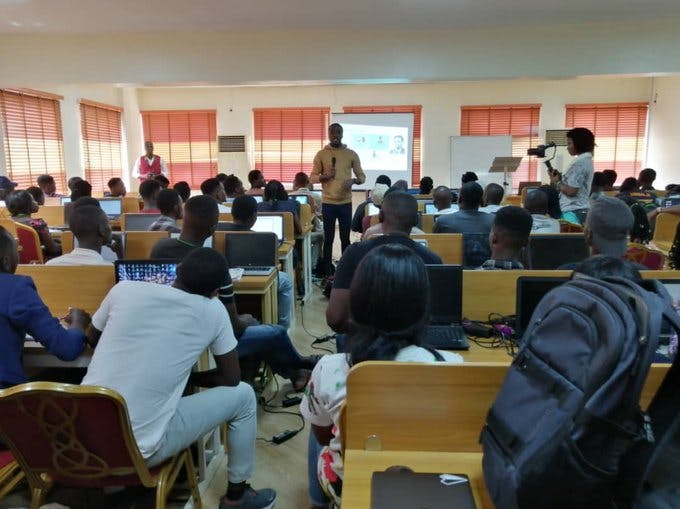
This session exposed most of my flaws as a ML Engineer. Majority of the class attendees struggled in this class. Most of we Data Scientists around don't really bother much about the underlying math to the technologies and library packages that we make use of regularly.
Even I, as a Computer Science undergrad with a very rigorous math background, struggled to keep up with our instructor when we got to topics like Mathematical Optimization, Gradient Descent, Stochastic Gradient Descent and so on.
I plan to correct this deficit in the coming months. Bright days ahead, folks!
Lunch.
PARALLEL SESSION - Hands-on Machine Learning and Deep Learning via mini-projects.
Key Concepts in Deep Learning.
by Dr Stephen Odaibo , CEO/Founder Retina-AI, Houston, USA.
No Deep Learning, for me.
Key Concepts in Machine Learning.
by Samuel Edet , Doctoral Researcher , Economics, Networks and Business Analytics at IMT School for Advanced Studies, Italy.
It was a continuation of the earlier session. Here, we had a hands-on session with Data Cleaning and Exploration.
By Data Cleaning, I don't mean the kind of cleaning we do on Kaggle with datasets that are already precleaned.
By Data Cleaning, I mean web-scraped data in which we had to remove all non-English words, emoticons and likes.
It was just mindbloggling! The task seemed easy enough. Build a model that can predict if a movie will have a positive review or a negative review.
But cleaning the raw data is not something I'd call "easy".
Another Samuel Edet's class highlighted another area I really need to work on. EDA
Women in AI Session.
by Dr. Sakinat Folorunso , Computer Science Lecturer/Researcher, OOU & Lead for WIDS.
It's for Ladies.
Dinner
Thursday 21 November 2019 : Theoretical Depth and Exploration.
Trustworthy Machine Learning and Robust Artificial Intelligence.
by Prof. Thomas Dietterich, Distinguished Professor (Emeritus) and Director of Intelligent Systems Research at Oregon State University
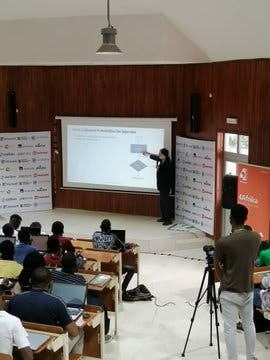
I was feeling ill here, so I didn't really listen during this session.
Problem-solving and Solution Approach in Artificial Intelligence.
by Sabrina Smai , Software Engineer – Microsoft, Canada.
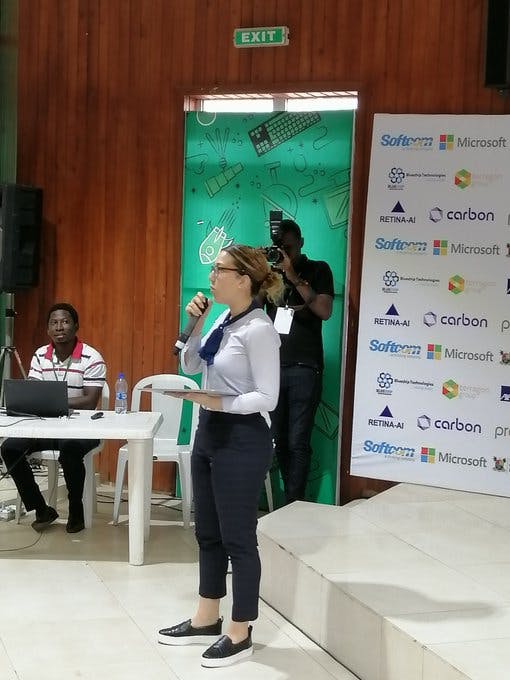
This! Is one of my favorite sessions in the bootcamp.
Telling us about her first, nerve-racking, hackathon experience in a very comical way, Sabrina Smai enlightened us about using EPIC as a problem-solving tool for AI and for life problems, in general. E P I C stands for;
- Empathy: Understand the people's feelings.
- Problem Statement: Understanding the problem you want to solve.
- Ideate: Try and come up with as many solutions as possible. Remember; Quantity over Quality.
- Create: See your most optimal solution into production.
Using EPIC, she came up with a novel idea, and her team won the hackathon.
She went on to participate in over 30 hackathons more.
Breakfast
PARALLEL SESSION - Practical AI in use.
Cognitive Solutions Development in Microsoft Azure.
by Margaryta Ostapchuk ,Technical Evangelist, Commercial Software Engineering team, Microsoft Canada.
I could only pick one class.
Artificial Intelligence for Financial Inclusion.
by Pascal G. Bernard, Head of Data Science; Jacobo Varela , Data Scientist; CARBON/ One Finance & Investment Ltd., London
Sadly enough, I didn't attend.
Artificial Intelligence for Health: use for non-traditional data for Health Risk Prediction.
by Elaine Nsoesie PhD , Assistant Professor at Boston University School of Public Health/ Institute for Health metrics and Evaluation.
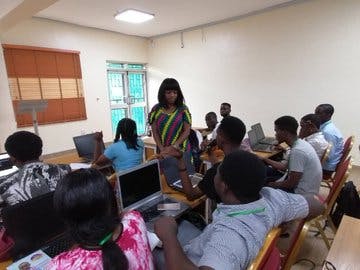
This was a very interesting session. Very insightful. It made me to finally decide that "AI for Health" is not my thing. It's not most Data Scientists' thing, neither (I don't if they know it yet or not).
There was a point during the session where Prof. Elaine asked us to form groups and discuss health problems we could solve with AI. Can you guess the problems that almost all the groups came up with?
Yeah, you guessed right! It was Malaria and Cancer.
I checked the poster projects on display on Saturday and 3 out of the 5 poster projects were on Malaria Classification.
Innovation is the process of creating value by applying novel solutions to meaningful problems. But without the necessary domain knowledge, can we actually innovate?
Recently, I was having a chat with a friend who is a medical student and she told me about Intraocular Pressure, which is the leading cause of blindness in the world. She told me about how nice it would be if there are portable, mobile devices with which patients can carry out Ocular Tonometry without even having to come to the hospital. I don't see how a Data Scientist with CS, Math or Engineering background would have come up with an idea like that, without domain knowledge.
Maybe healthcare professionals should learn to use AI more, as a problem solving tool, or maybe Data Scientists should delve deeper into the health industry. That domain knowledge is very crucial in developing novel solutions to health problems.
PARALLEL SESSION: AI Theories in Practice.
Natural Language Processing.
by Kathleen Siminyu , AI for Development Network, Kenya; Ayodele Olabiyi , Product Researcher and NLP Project Lead, Data Science Nigeria; Wuraola Oyewusi , Research/Innovation Lead, Data Science Nigeria.
I didn't attend this.
Anomaly Detection with BigML – Theory and Application.
by Prof. Thomas Dietterich, Distinguished Professor (Emeritus) and Director of Intelligent Systems Research at Oregon State University; Guillem Vidal, ML Engineer, BigML, Inc.
I could only attend one of the parallel classes.
Computer Vision CNN: Convolutional Neural Networks
by Dr. Emmanuel Doro, Director of Data Science, Walmart, USA.
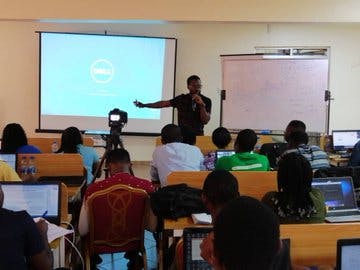
This is my overall best session at the bootcamp. Dr. Emmanuel is the kind of instructors you'd envision seeing in academics, but you know that'd be too good to be true.
He didn't teach us the Computer Vision he was supposed to take us. Hell, he didn't even touch his slides for once, throughout his 4.5 hours of class.
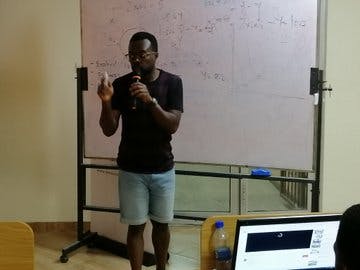
But his class was by far the best class I'd ever been in my life! And by the time it ended, I didn't want it to end.
Keynotes:
Knowledge of Feature Engineering is the difference between a struggling data scientist and an excellent data scientist.
Yes. You'll need all those math as a data scientist. Dr. Doro said he, personally, won't hire you. Even if he hire you, he'd probably fire you! (Sounds meta eh?!)
Writing scientific Research paper and PhD readiness
by Elaine Nsoesie PhD , Assistant Professor at Boston University School of Public Health/ Institute for Health metrics and Evaluation.
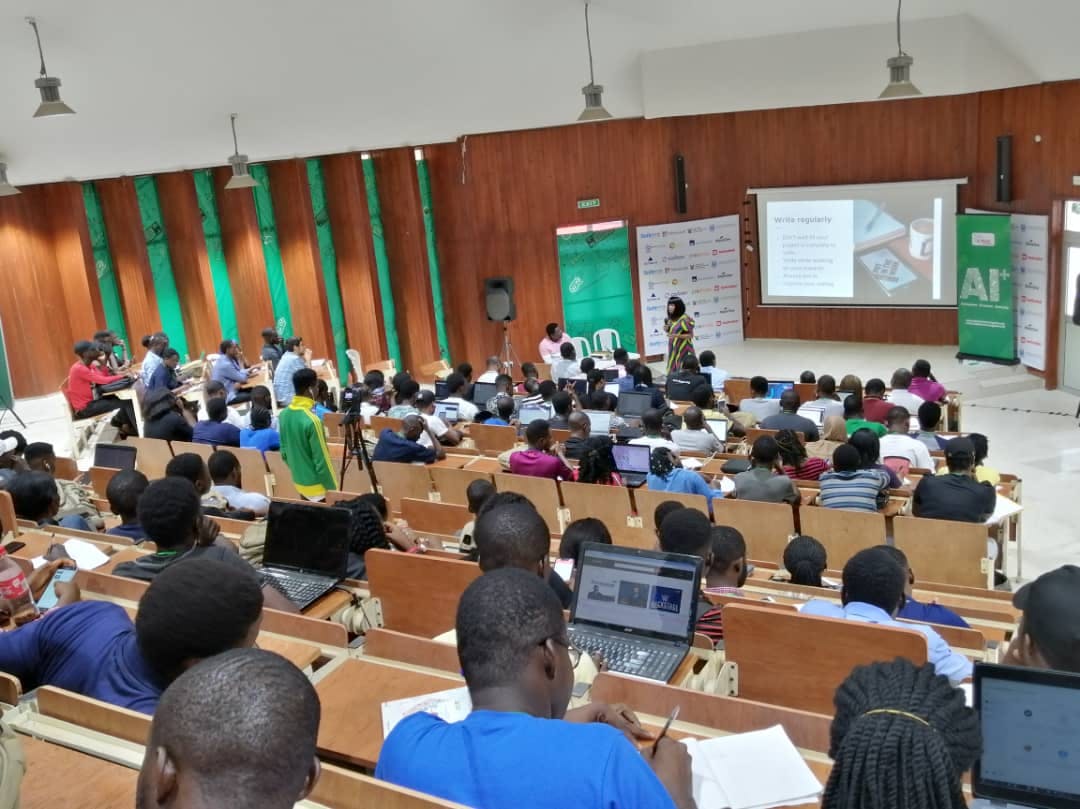
For the 2nd time on Thursday, the young professor anchored another class I was present in. Prof. Elaine lecturing is like a duck in water.
The main focus of this session was on how to write academic papers. Scientific papers, especially in Artificial Intelligence, require depth, solid research and right guidance. And a good scientific writing must be well structured logically, accurate and objective.
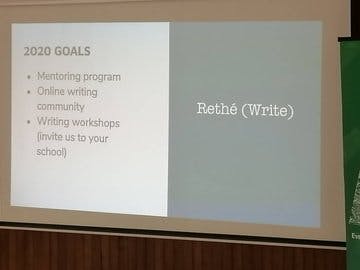
The main points from this session were;
- Learn How to Write Well
- Read extensively.
- Write regularly.
- Don't write alone. Find peers and mentors who can write well.
She also introduced us to Rethe Writing Community where we can find mentors willing to help in structuring our scientific papers and build our writing skills.
Pitching ideas & running an AI Start-up
by Osayi Igharo , Managing partner, Ripple VC, USA.
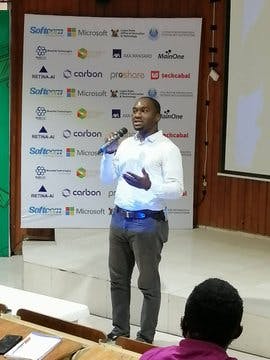
Another class I really enjoyed well. I watched Silicon Valley and the Founder earlier this year, and this session is just like a confirmation and reinforcement of valuable tips I'd taken note of in those two movies. The main takeaways are;
- Build a well-functioning team.
- Market timing.
- Your Product.
- Business Model. You need to get your business model right when building a startup. How you deliver value is very important.
- Securing Funding.
Other extra tips are;
- Build a moat (a sort of defensibility) around your business.
- Get feedback from your customers. The happier they are, the more money they are going to pay.
- Keep your customers happy, so you can have a high retention rate. It is easier to retain your existing customers, than to find new customers.
Dinner.
Friday 22 November 2019 : Real-world Application Enablers and Use cases.
Microsoft Azure DevOps Best practice.
by Dara Oladapo , Customer Success Manager, Microsoft4Afrika
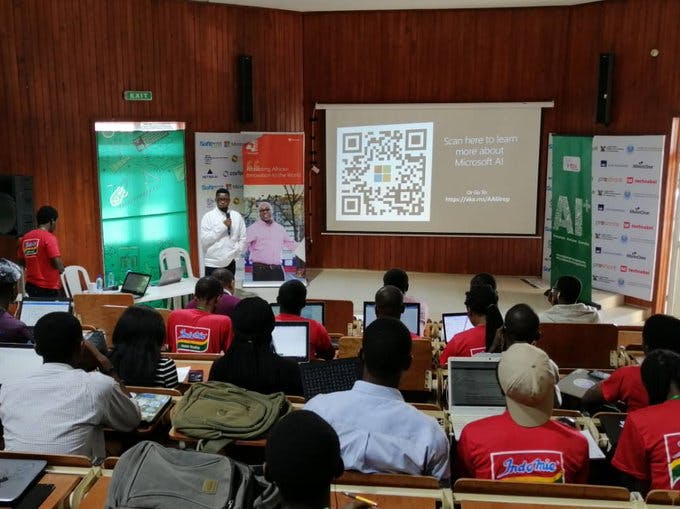
Mr. Dara defined what DevOps as the union of people, process and products to enable continuous delivery of values to your end users.
He also defined Done as "live in production, collecting telemetry..." and also explained how DevOps allow you to automates the processes between your software development and IT teams, so that they can build, test, and release software faster and more reliably.
There's not much to the session. It is more about how DevOps works in day-to-day operations of Microsoft.
Introduction to Mechanism Design.
by Eric Sodomka PhD , Research Scientist, Facebook Research.
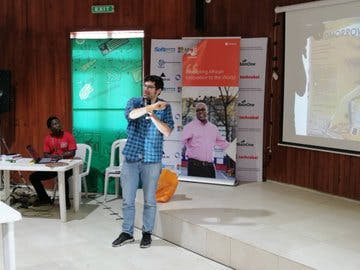
This was an introduction to Mechanism Design problems and solutions. Dr. Eric also shared insights on some of the research his team has been working on over at Facebook, and also using Mechanism Design approach to develop solutions to problems.
PARALLEL SESSION - Methodologies for real-world Application.
Project-based immersion into Machine Learning best practices for Digital Media and Programmatic Advertising Analytics.
by Mohit Rawan, Terragon (Dial-in session).
I didn't attend.
GRID3 for GeoSpatial Analytics for Nigeria.
by GRID3 team.
...
Introduction to Mechanism Design.
by Eric Sodomka PhD , Research Scientist, Facebook Research.
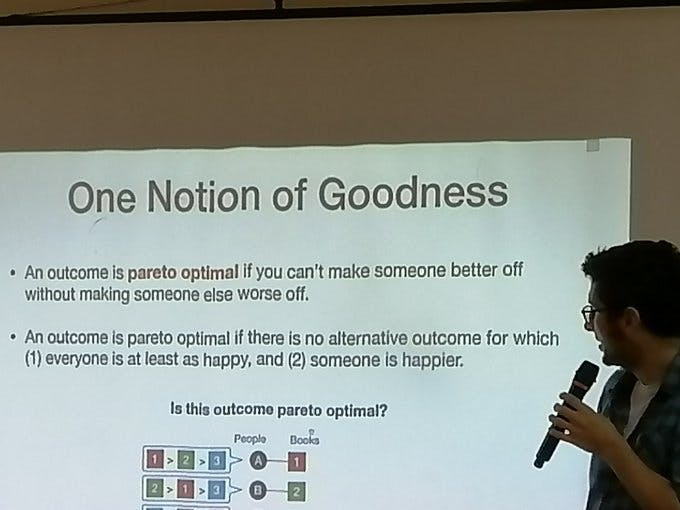
This was a continuation of the earlier introductory class. Here, Dr. Eric explained concepts in Mechanism Design like Pareto Optimal, Serial Dictatorship, Strategy-proof, Abridged Serial Dictatorship with vivid and illustrative instances.
Below is one of such instances. A lady and I were been used as guinea pigs to illustrate the concept of Abridged Serial Dictatorship.
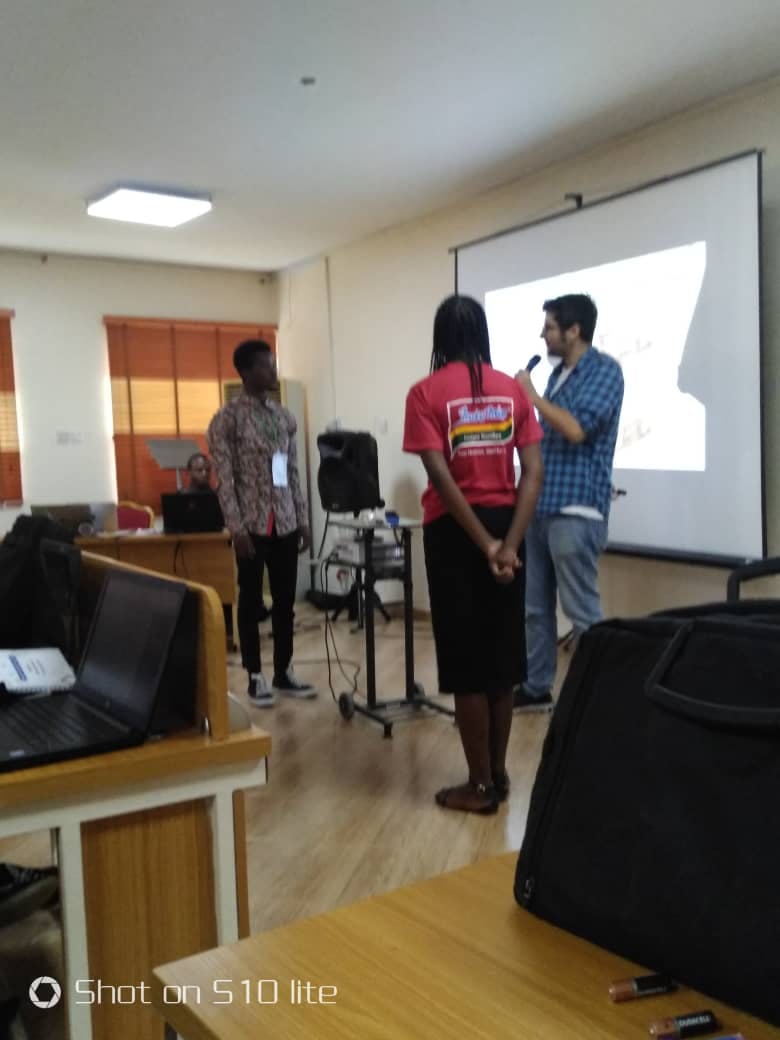
Unfortunately for me (but fortunately for the lady), I lost the toss to the lady and she won 3 grand (Painful. A bit.). Now after missing out on winning myself some cool cash, I don't think I can ever forget the Abridged Serial Dictatorship concept.
This is what I meant by "vivid and illustrative instances".
Open House: Building a World-class Career in AI and Data Science.
- Dumebi Okwechime PhD , Chief Decision Scientist – Renmoney, Lagos.
- Nicholas Litombe PhD , Senior Data Scientist at Unacast, USA.
- Margaryta Ostapchuk , Technical Evangelist, Commercial Software Engineering team, Microsoft Canada
- Sabrina Smai , Software Engineer – Microsoft, Canada.
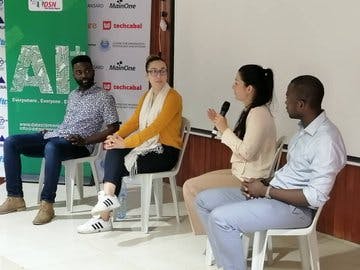
Very helpful and insightful. Very. Interesting questions and equally impressive answers are the hallmarks of top-notch Open House sessions like this.
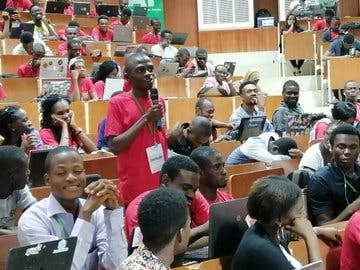
The highlight was when that visiting UNILAG Computer Science lecturer was given the microphone.
Hilarious? Very! I don't think there was any other moment throughout the bootcamp than got more applause and ululation that this highlight.
But she actually pinpointed the many troubles and difficulties we face as data scientists, in getting quality training and getting organizations to give us data to work with, here in Nigeria.
What Industries are looking for in a Data Scientist.
by Uzo Mkparu HCIB , Assistant Vice President/Group Head, CRM, Customer Analytics & Insights, First City Monument Bank Limited.
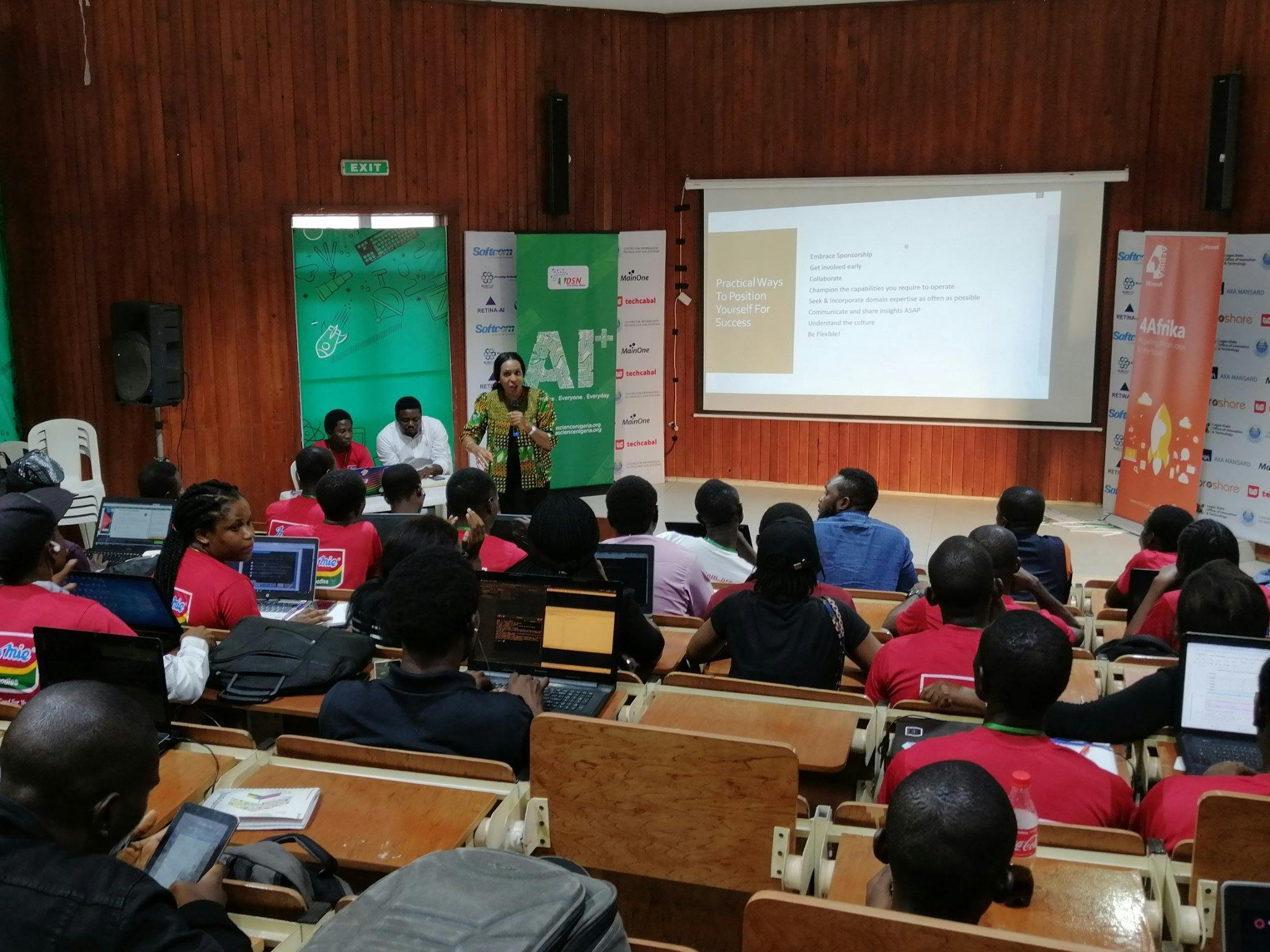
This was immediately after the Open-House session, and it was one of my favorite sessions.
She talked about what industries want from Data Scientist:
To use data and additional analytics to solve business problems, thereby adding value and improving overall business performance.
She also talked about practical ways to position oneself for success, which are:
- Embrace Sponsorship.
- Get Involved early.
- Collaborate.
- Champion the capabilities you require to operate.
- Be flexible.
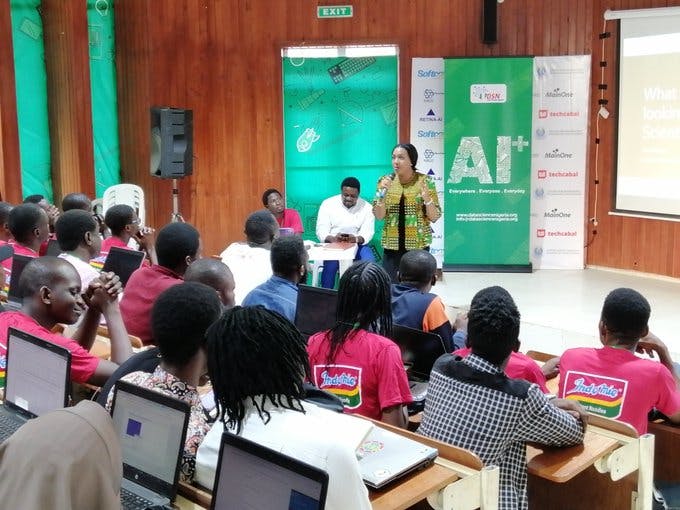
Buoyed by the UNILAG lecturer's ranting, the students did really pepper our lecturer with questions (more of complaints and misgivings, really) about companies' hiring processes. And she handled all questions perfectly.
Here is the bottom line of everything:
If you want something badly enough, go for it!
Introduction to the Insurance Dataset for Recruitment by Axa Mansard (24 hour Hackathon).
by Bayo Adesanya, Chief Digital Officer, AXA Mansard.
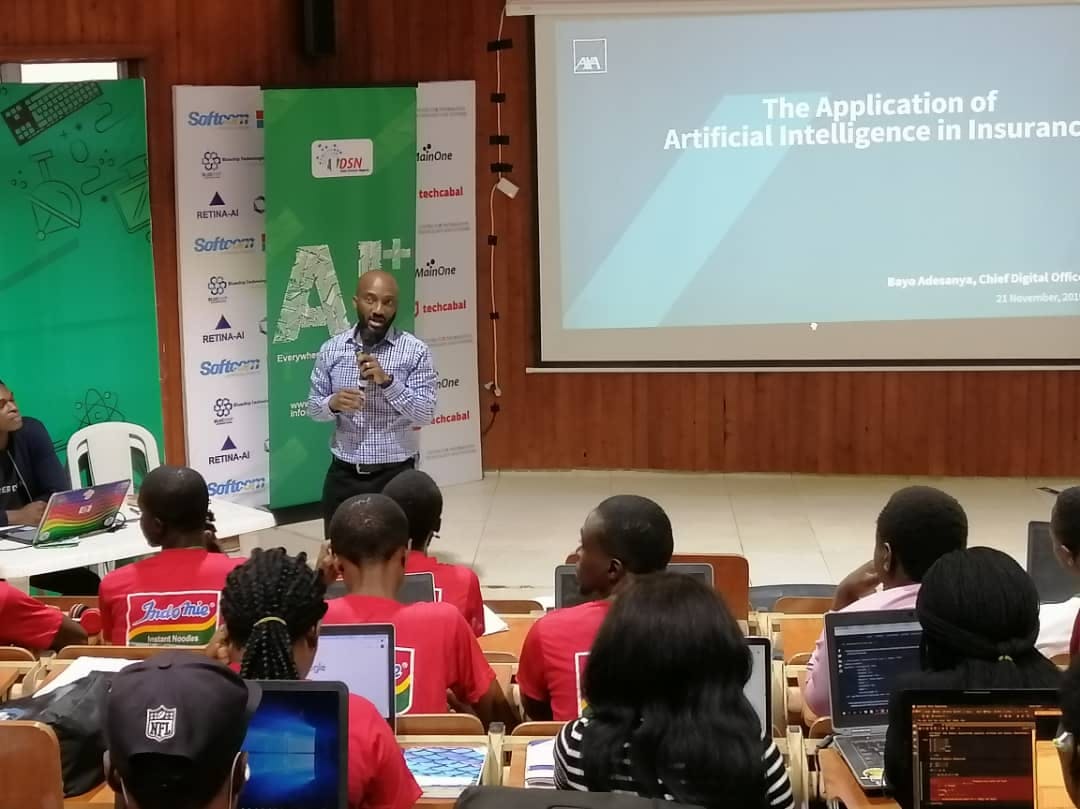
Mr. Bayo introduced us to the Hackathon hosted by AXA Mansard. He also took his time to highlight us on the future of insurance (he showed us a badass video clip, too), emerging AI trends solving the problems of insurance, and how it affect us as data scientists.
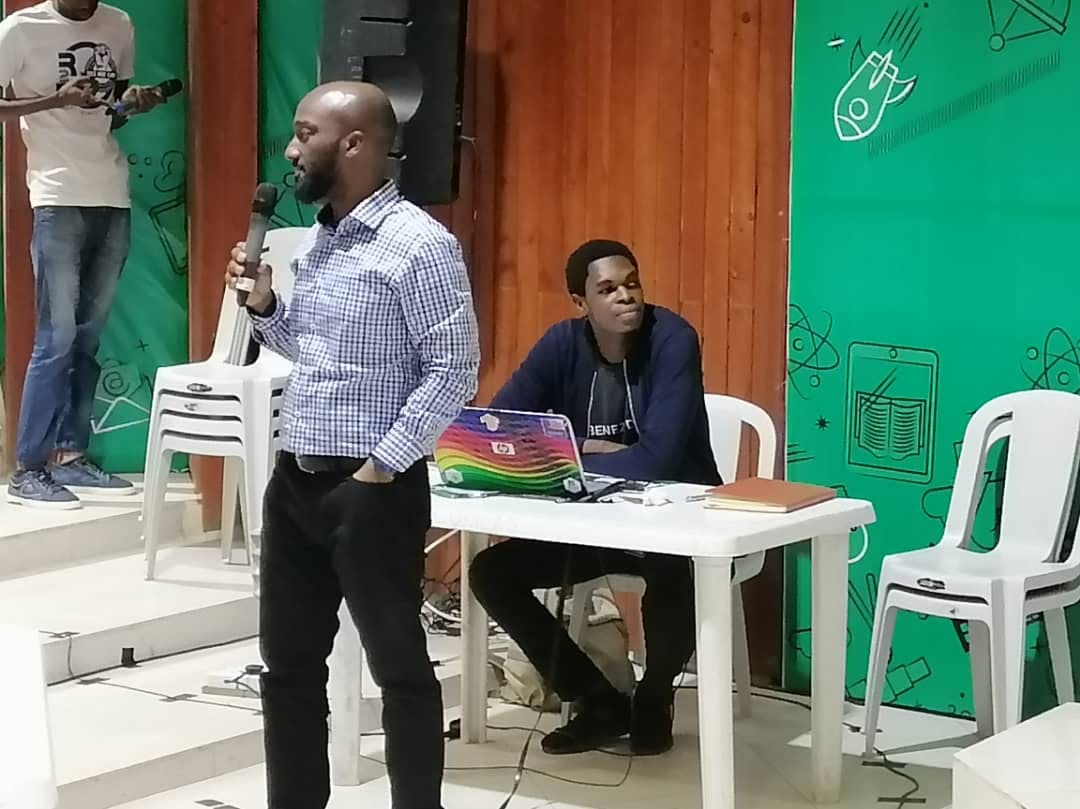
Dinner.
Hackathon Individual Work Session.
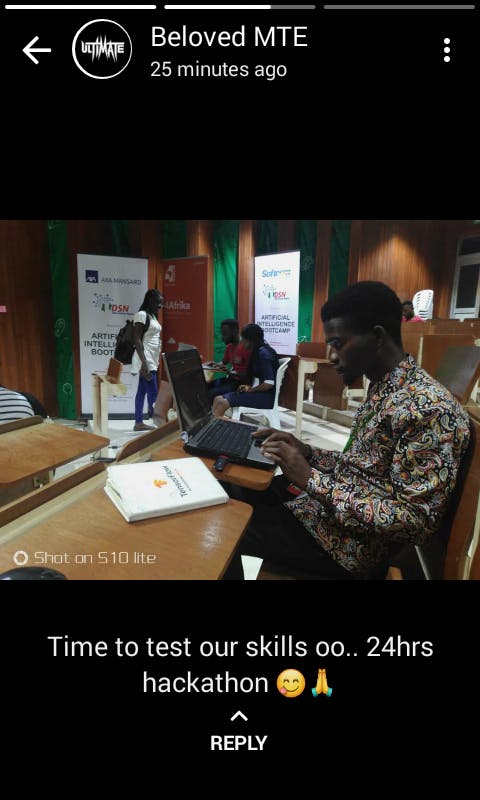
I didn't sleep until minutes past 2. By the time I slept, I was on position 24 on the Hackathon's leaderboard.
By the time I woke up at 6, I've slipped down to position 44 (Seems that some people didn't bother sleeping at all.)
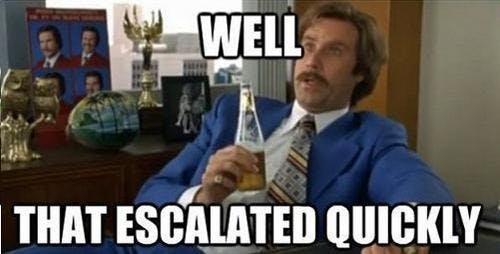
By the time it was lunch, I'd stopped slipping and I was fixed at position 99. I just...

#Saturday 23 November 2019: Real-world Application Enablers and Use Cases.
Statistical Best Practice Masterclass.
by Kris Sankaran PhD , postdoc at MILA, Montreal, Canada; Nicholas Litombe PhD , Senior Data Scientist at Unacast, USA.
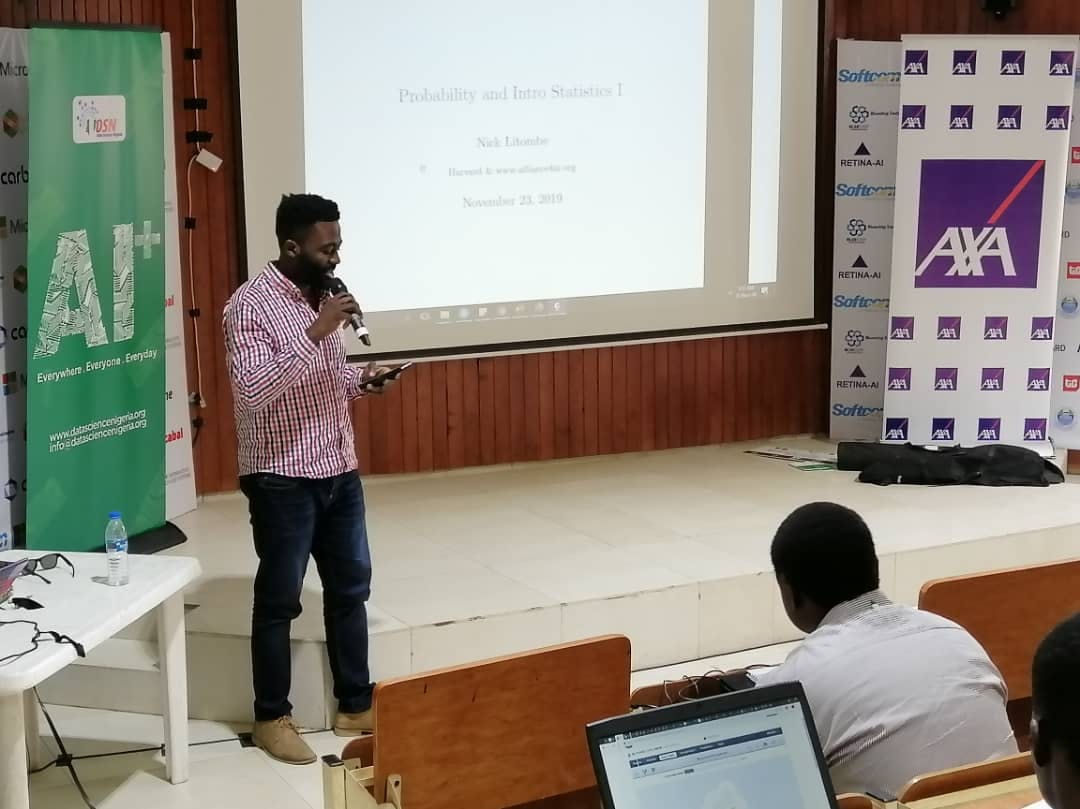
Honestly, I didn't listen to a single bit of word in this class. Every ounce of focus was on my jupyter notebook.
Breakfast.
Deep Learning with Microsoft Azure.
by Dr Nnanna Orieke , Cloud Solution Architect Data and AI at Microsoft; Margaryta Ostapchuk , Technical Evangelist, Commercial Software Engineering team, Microsoft Canada; Sabrina Smai , Software Engineer – Microsoft, Canada.
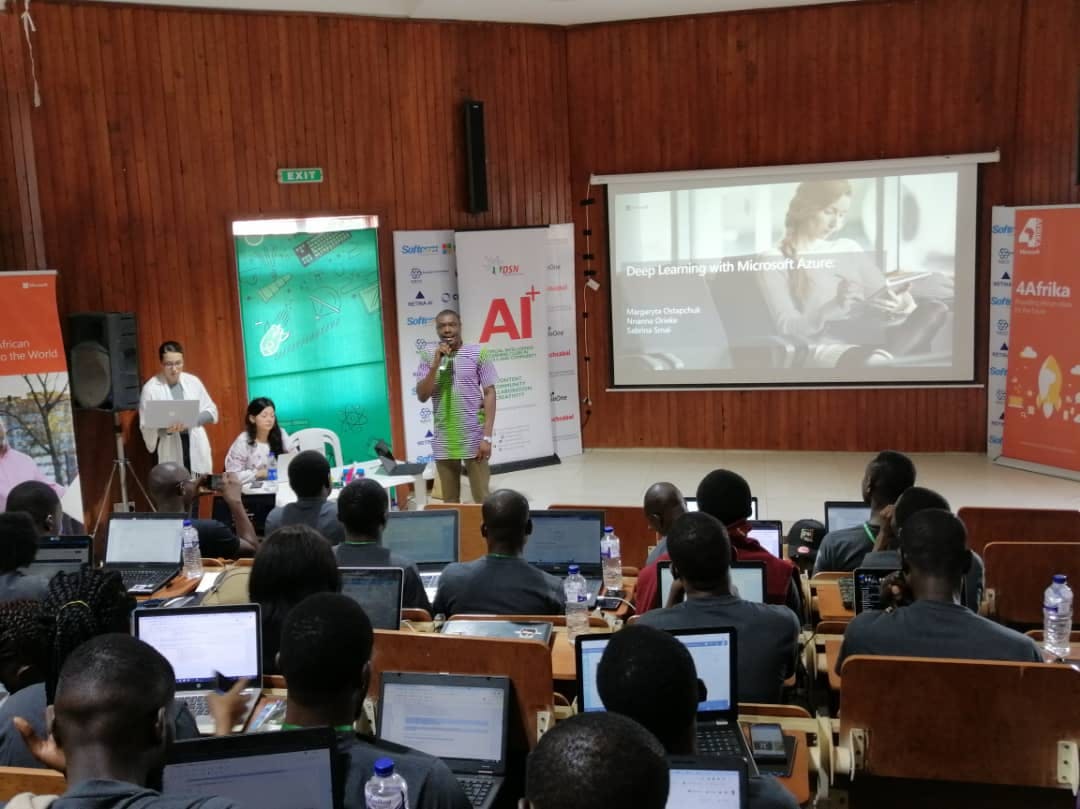
This was our final session. I didn't listen, at first. But I later did when I heard that gifts would be handed out to the top participants.
It was mainly about building, training and deploying faster ML models on Azure. There were some little code sessions, too.
At the end of the session, I won myself a Microsoft t-shirt for asking a question! Cheers!
Recording of Intercampus AI competition.
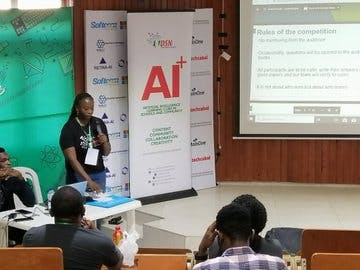
The top 20 participants in the InterCampus ML competition we did as qualifiers, together with the top 3 female participants and 2 AI Campus Ambassadors outside the top 20, participated in a mini competition in which the top 2 winners would qualify for fully-funded scholarships for M.Sc in Artificial Intelligence at the Stellenbosch University, South Africa.
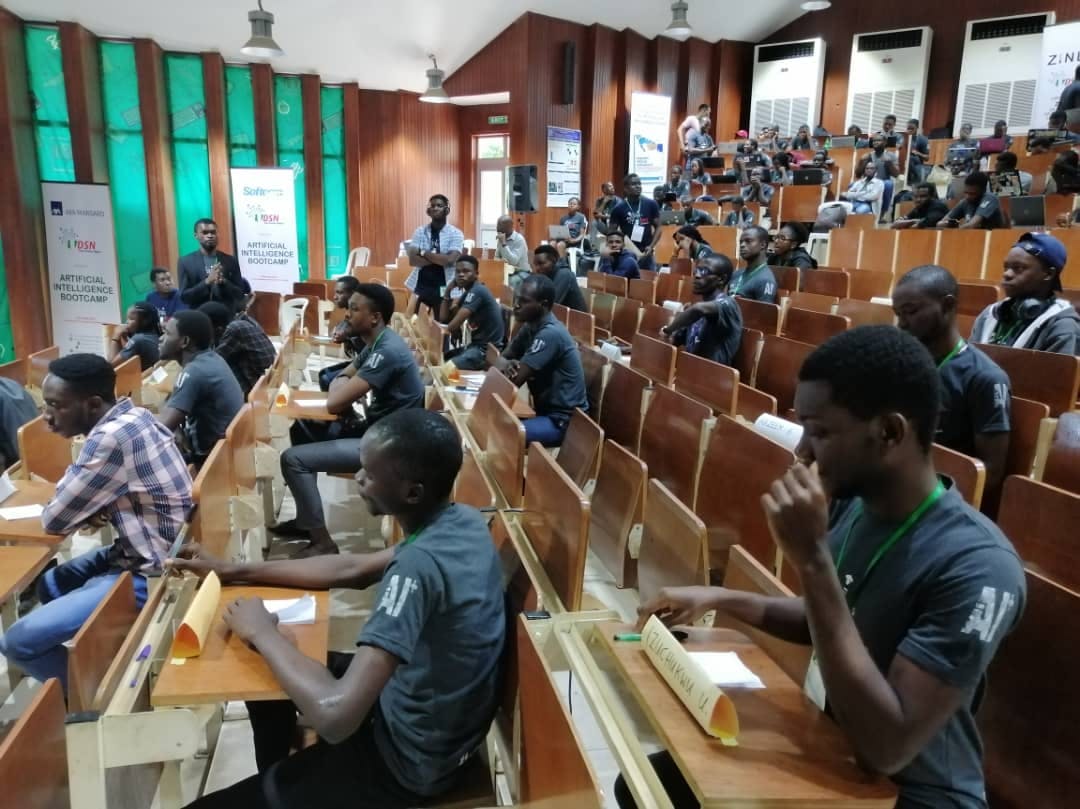
Obinna Onuoha and Hakeem Kazeem were the proud winners of the competition.
Award Night/ Dinner.
- Bluechip Technologies – Best student in InterCampus Machine Learning competition. - won by Obinna Onuoha.
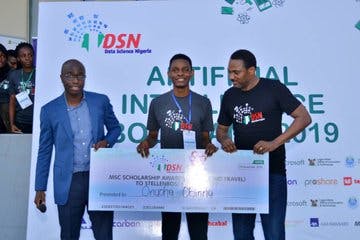
- Microsoft - 2nd Best Student in InterCampus Machine Learning competition. - won by Hakeem Kazeem.
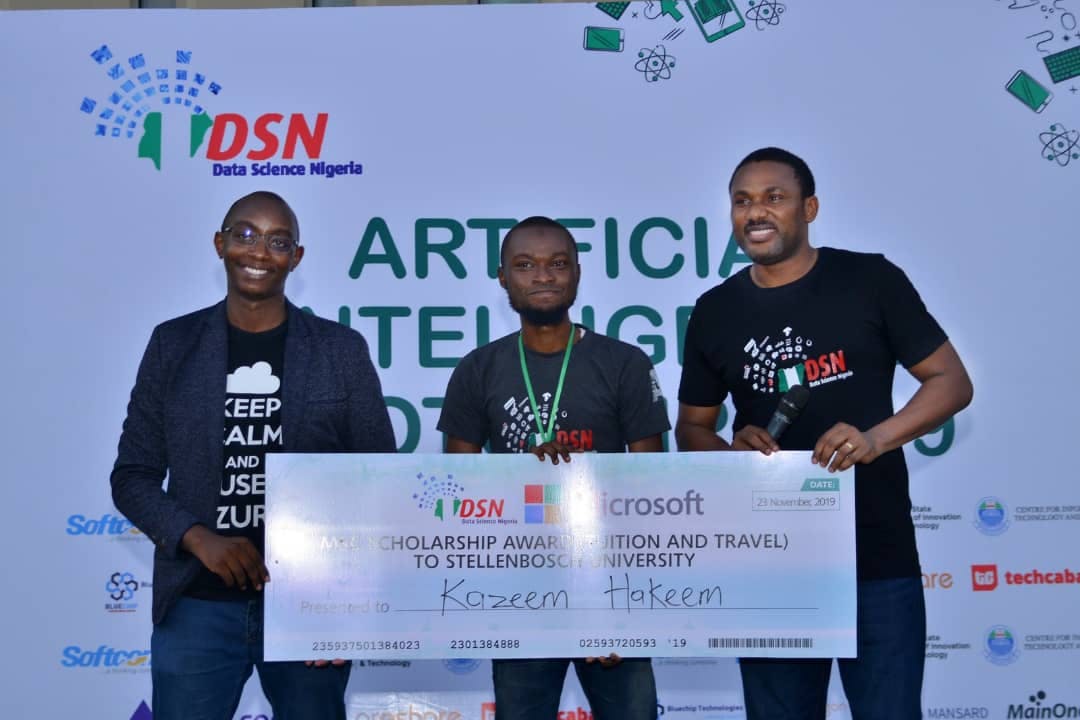
- Terragon - Mr. Algorithm - won by Rising Odegua.
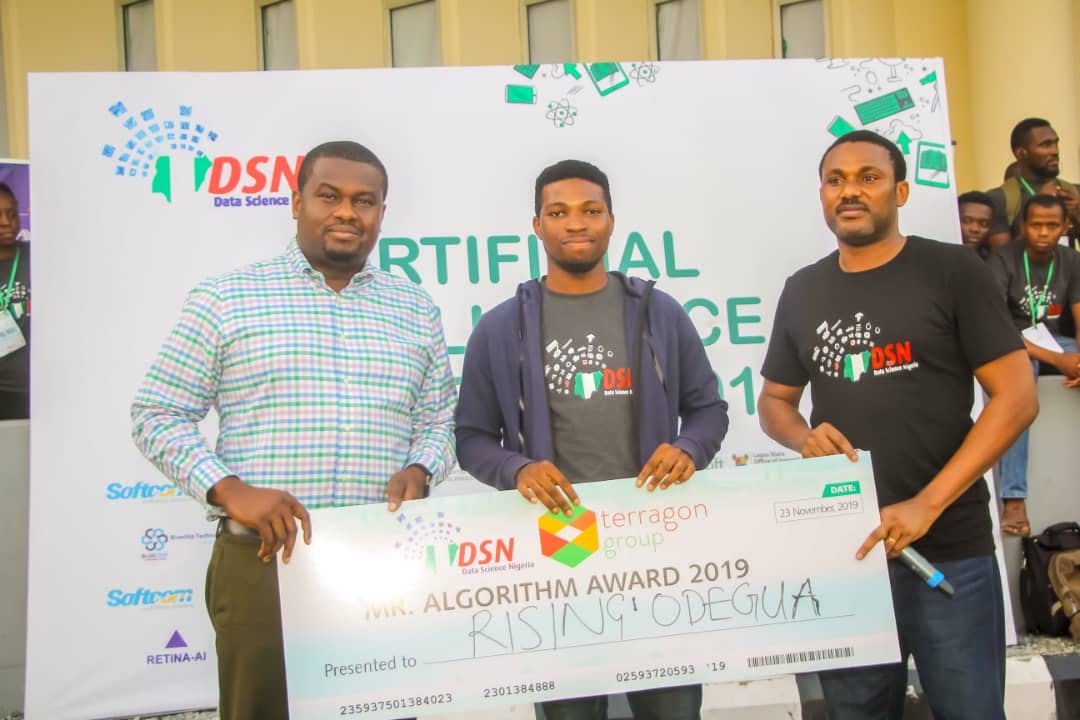
- Terragon - Ms. Algorithm - won by Adeola Lawal.
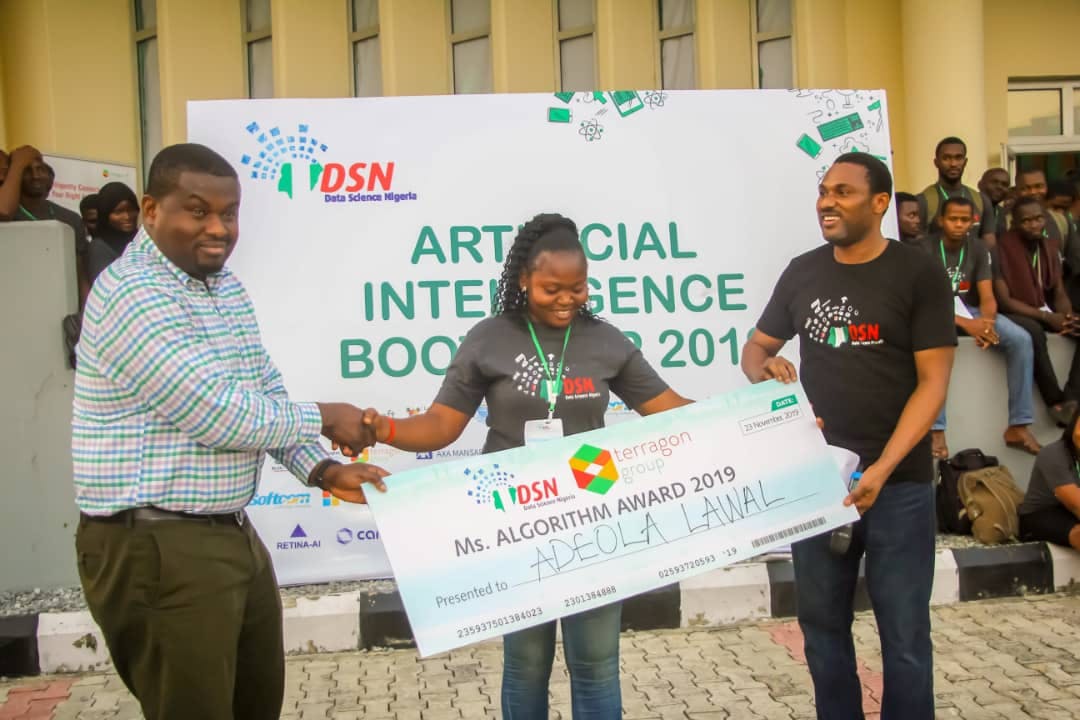
- Terragon - 2019 AI School of the Year (The school with the highest number of participants on the qualifying competition's leaderboard). - won by UNILAG, 1 million naira for AI library in CITS, UNILAG.
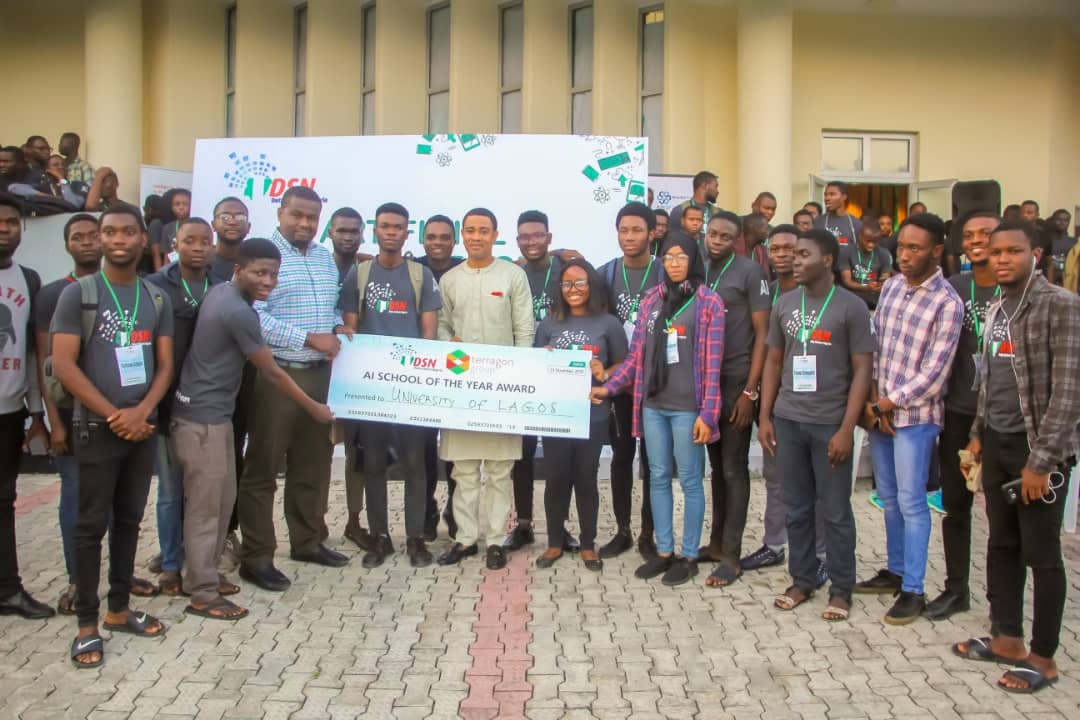
- Retina - AI Best Poster on Artificial Intelligence for Social Good. - won by Rising Odegua.
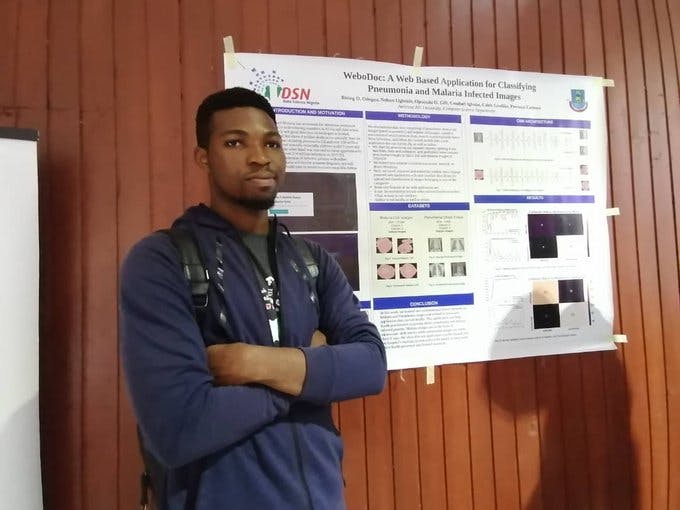
- MainOne Best Female Data Scientist. - won by Sarah Adigwe.
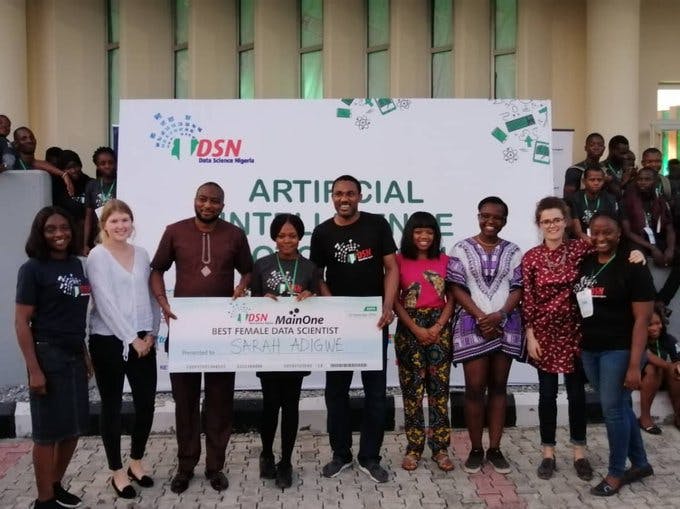
- Axa Mansard - Winner of the Insurance Hackathon. - won by Raheem Nasirudeen.
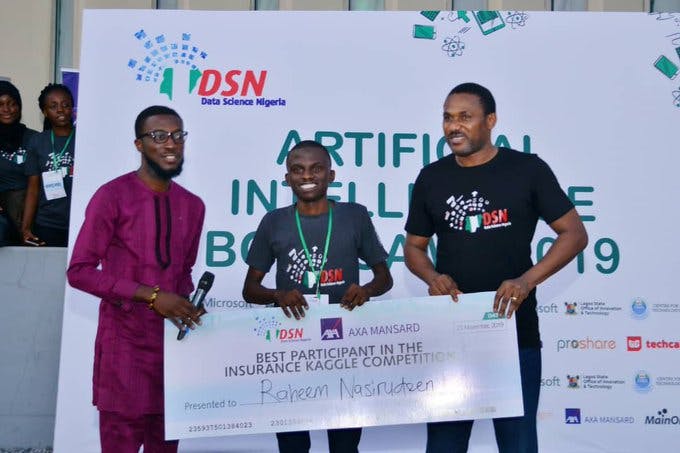
- Special Recognition award to the AI+ city leads.
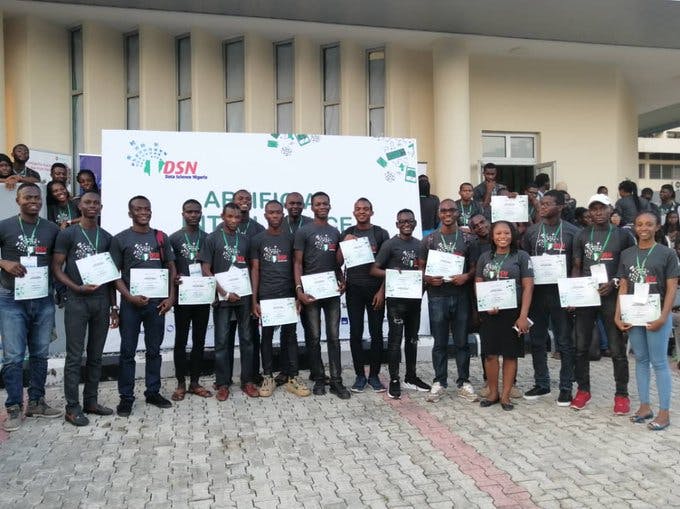
- Carbon Award for Industry Support and Promotion of DSN.
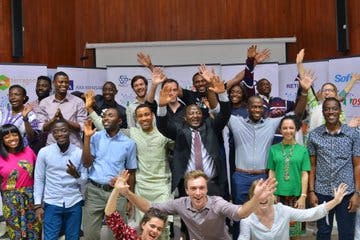
Sunday 24th November 2019: Departure.
Most of us left quite early in the morning. My departure was somewhat emotional. The bootcamp is the BEST thing that happened to me this year.
Ratings
Food
Breakfast: Usually a case of bread/yam with beans/stew, fish, egg and coffee/chocolate drink. There were some few mornings where we ate Jollof with chicken and fish/beef.
Lunch: An affair of finger foods (Nigerian small chops)/biscuits with soft drinks.
Dinner: My best of the whole lot! Fufu/Amala with ewedu/efo riro soup, fish, beef and there's always the white rice alternative for those who don't prefer swallows.
The food was the main reason I didn't feel like coming back home. I reckon I gained myself some few ounces of fat during my one-week stay.
I was surprised when food were packed in disposables for us on the departure day. I couldn't help but blush at the extreme benevolence of Data Science Nigeria.
The only blemish; there were no toothpicks (Except during lunch). I like picking my teeth after a hearty meal.
Accommodation
Our lodge was an enormous, gigantic building. Mainly made of two-occupants rooms, I was a tad unlucky to get allocated to one of the only two dormitories available (I've always detested staying in a dorm). It wasn't half bad, though.
And luckily for me, no one snored in my dorm throughout my stay in there.
Travel Grant
Stipends, for transportation, were provided for those of us who were students.
For that, my thanks!
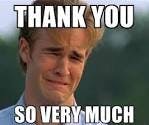
What's Next?
This is a picture of we guys from FUNAAB with the Microsoft Ladies...
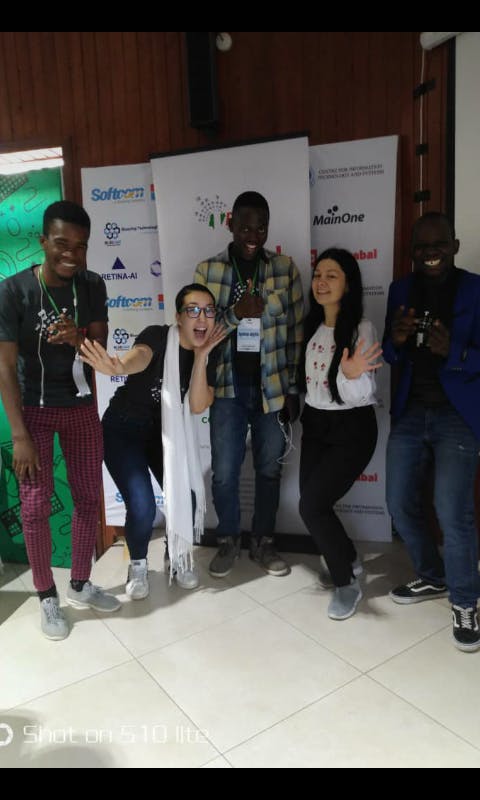
Yeah, you saw right! It's just three of us. Our fledging AI+ club is just a few months old.
This is a picture of how we want to look like come 2020 AI bootcamp.
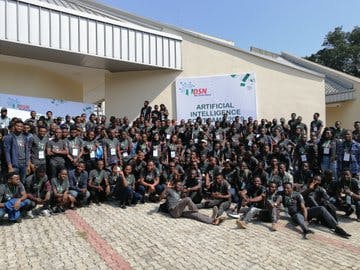
Yeah, you saw right! As many as that. The world belongs to those who believe in the beauty of their dreams.
What's Next, for me?
I want to work on my knowledge of EDA. I want to become mathematically rigorous. I want to see a ML model of mine being deployed in a web app.
Finally...
If you've read my story up to this point. I'd say a big thank you for not giving up and reading from start to finish. It shows that you a man (or lady) of resilience and amazing determination.
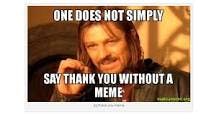
And for this single virtue, I'm so psyched to know you better. Do link up with me on LinkedIn (another meta eh?!) and Twitter.
One final favor from you (this'd mean a lot to me): If you find this article interesting/insightful...
There are some magic buttons down here. Click on them and see what happens.
